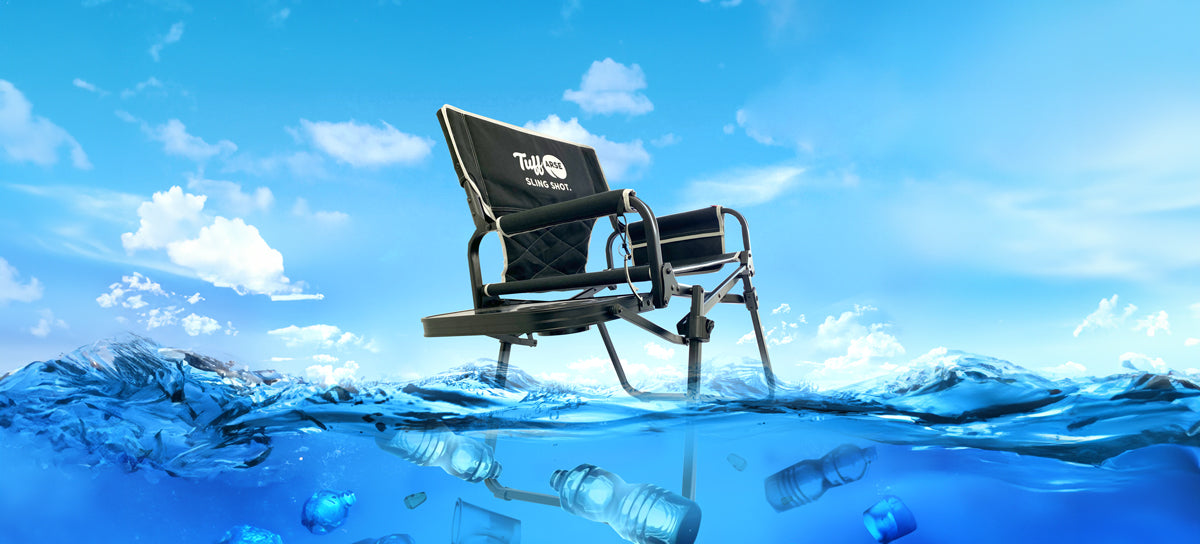What's the deal with Recycled PET? What is it and why are we banging on about it?
Recycled PET Fabric is also known as 20A Canvas, RPET, Recycled Polyester and a bunch of other names, but all are essentially one thing: A fabric made entirely from recycled plastic. Specifically plastic bottles, plastic ocean waste and discarded textile and fabric scraps.

Tuff Arse Recycled PET heavy duty fabric is literally 100% rubbish saved from landfill or from clogging up our oceans and water ways. Tuff Arse Camp Chairs Recycled PET Fabric is certified with the Global Recycled Standard (GRS) who are listed on the Textile Exchange (peak association for all global textile accreditations). This creates a complete chain of custody going back to the origin mill that guarantees the authenticity of the recycled fabric.
If the product you have purchased doesn't carry official certification then it's not the real deal, you're paying for fake. How many manufacturers genuinely meet the certification is up for debate - unless their Standard is listed on the Textile Exchange then the material is NOT Recycled PET. It's why Tuff Arse Camp Chairs chain of custody goes back to our mill. It’s worth doing your home work when you buy any Recycled PET product to check this.
Ideally we’d stop using plastic altogether - until then let's at least recycle it:

Normal Polyester Fibre (or polyethylene terephthalate - PET) is the most widely used fibre in the world. With annual production of around 57 million tonnes (2020) it has a market share of more than 50 percent of total global fibre production. However the recycled PET fibre volume of this is only about 8 million tonnes or 14.7 percent. We made the decision to use Recycled PET Polyester on our SlingShot Directors chair because we felt the camping industry should do better, it’s the right thing to do even if it adds significantly to the cost of production. The pay off is not only is it recycled, but it's better. Stronger and more UV resistant to fading and tearing.
It’s still worth remembering though that to produce any recycled material it requires energy and resources, so it's not a perfect solution. Rather it’s a massive step in the right direction to eliminate waste, landfill and pollution. The best solution is simple... eliminate the use of plastics, completely.
Plastic was only invented in 1907 and we managed for thousands of years before that without it, so it's not inconceivable. Plastic is also a major contributor to the world's growing PFAS problem. PFAS are tiny micro fibres or ‘forever chemicals' used in every plastic consumer product around the world and are ingested by humans, animals, pretty much every living organism on earth. They are toxic and nasty, and we’re going to hear a lot about them in coming years.
To get rid of plastic, you can start simple, today… drink water straight out of the tap instead of buying bottles! Australia’s water is some of the best in the world and proven to be the same as the aqua you pay for in a bottle anyway. Plastic bottled water is possibly one of the biggest consumer scams is Australia: "Bottled water is no better than tap water, and it's not any healthier. Blind taste tests have also shown most people can't even tell the difference between bottled water and tap water”. - choice.com.au

In the meantime before we eliminate plastic completely Recycled PET is the next best thing. And whilst the environmental argument for its use is strong, there's an even better reason to choose heavy duty Recycled PET Polyester canvas; it has a higher tensile strength than heavy duty standard Polyester. So for the consumers who don’t care, they can still be happy knowing they have invested in a premium product.
So if you see a product that is made with Recycled PET, support it. Drive Meaningful change from the start of the supply chain. Take a step in the right direction.
For more info check out these links:
Textile Exchange
Global Recycled Standard
Choice Australia Bottled Water vs Tap
SlingShot Recycled PET Directors Chair




Leave a comment